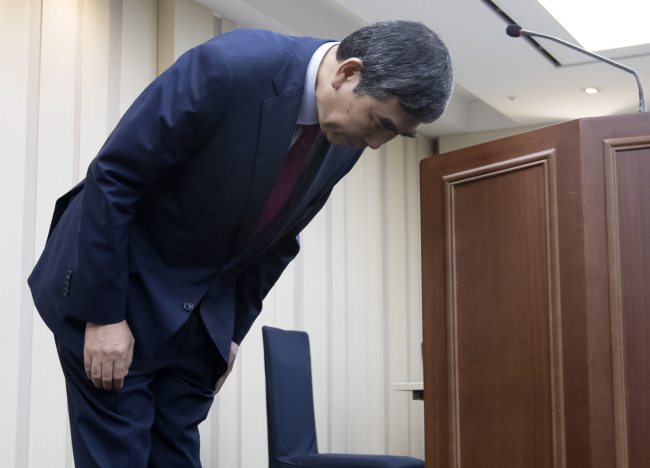South Korean drugmaker Hanmi Pharmaceutical’s plans to globally commercialize its novel lung cancer therapy are in jeopardy after a patient died of a severe skin-related side effect linked to the drug’s use.
The future of Hanmi’s lung cancer drug began to turn bleak Friday -- when Hanmi’s licensing partner Boehringer Ingelheim announced it would return the drug's development and commercialization rights it had purchased from the Korean drugmaker in July 2015 in a deal valued at $730 million.
The same day, the Korean Ministry of Food and Drug Safety prohibited doctors from prescribing Olmutinib to new patients and warned patients already using Olmutinib to “use the drug with caution” in consultation with doctors, citing three cases of life-threatening side effects linked to the drug’s use during clinical trials.
The ministry is scheduled to hold a meeting Monday to decide on the causal relationship between the drug and the given side effects to determine its next moves, which could include completely banning the drug’s sales, Yonhap News Agency reported.
 |
Hanmi Pharmaceutical CEO Lee Gwan-sun bows during a press conference held Sunday at the company headquarters in Seoul. (Yonhap) |
Hanmi’s lung cancer drug Olmutinib, also known as HM61713 or BI148294, is a third-generation lung cancer therapy for patients who have developed a tolerance to existing lung cancer treatments.
Olmutinib was conditionally approved for sale in Korea in May under the name “Olita Tab.” after completing just first and second phase trials held locally. The firm is mandated to submit the results of the drug‘s third phase trials at a later date.
At the same time, the German pharma giant had been carrying out second phase clinical trials in Europe, with plans to begin second stage trials in the US where the drug was designated a “breakthrough therapy” by the US Food and Drug Administration.
However, Boehringer Ingelheim announced Friday that it is terminating its licensing deal with Hanmi “based on a re-evaluation of all available clinical data on Olmutinib and recent treatment advances made in the treatment of EGFR mutation-positive lung cancer.”
The same day, the Korean Drug Ministry issued a new guideline for the use of Olmutinib, citing three cases of serious skin-related side effects found among patients partaking in the drug’s clinical trials.
A Hanmi spokesperson told The Korea Herald that the firm is in the process of determining exactly where the three cases were reported.
Of the 730 patients treated with Olmutinib, two patients showed symptoms of toxic epidermal necrolysis, while another patient was diagnosed with Stevens-Johnson syndrome.
Among the two patients diagnosed with TEN, one died due to the skin condition caused by using the drug, while another recovered. The patient diagnosed with SJS died due to the progression of the patient’s lung cancer.
The first death, which took place during Boehringer Ingelheim’s second phase clinical trials held abroad, was reported to the ministry in April. The two additional cases were reported in June and September, respectively.
Hanmi Pharmaceutical CEO Lee Gwan-sun said the company is “examining multiple ways as to how it will continue on with the development of Olmutinib,” vowing to “set a direction in the near future” during an emergency press conference held Sunday.
For the time being, the Korean drugmaker plans to conclude the ongoing second phase trials taking place in Europe on behalf of Boehringer Ingelheim by the end of next month, as scheduled.
Meanwhile, Hanmi pointed out that multiple considerations in addition to the deaths caused during the Olmutinib’s clinical trials led Boehringer Ingelheim to abandon its development of Olmutinib.
Global pharma giant AstraZeneca has been making headway in developing a similar targeted lung cancer treatment known as Tagrisso (AZD9291). The firm submitted the results of its third-phase clinical trials to the US Food and Drug Administration in July.
In the case that Tagrisso is approved before Olmutinib -- which now appears highly likely -- Boehringer Ingelheim would have a hard time finding patients for Olmutinib, a drug meant for use by patients with no alternative treatment options, Hanmi Vice President Son Ji-woong said.
The Seoul office of Boehringer Ingelheim declined to further comment on its headquarters' reasons for ending its licensing partnership with Hanmi Pharmaceutical.
By Sohn Ji-young (
jys@heraldcorp.com)








